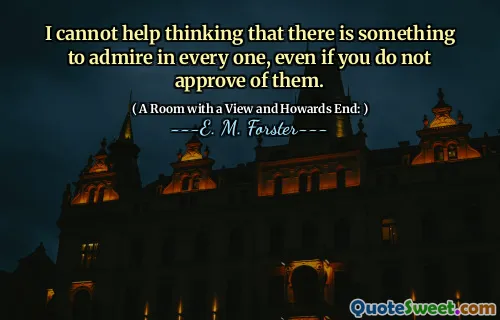"A Room with a View" is a novel by E.M. Forster that explores the contrasting lives of its characters, particularly focusing on Lucy Honeychurch, a young Englishwoman. The story unfolds in Italy and England, highlighting Lucy's internal struggle between societal expectations and her desire for genuine love and freedom. The novel critiques Edwardian society, particularly the constraints placed on women and the class system, as Lucy navigates her feelings for George Emerson and the more conventional Cecil Vyse.
"Howards End," another of Forster's major works, delves into themes of social class and connectivity among its characters, primarily the Schlegel sisters, Margaret and Helen. The narrative examines their relationships with the Wilcox family, embodying different social classes and values in early 20th-century England. The novel emphasizes the importance of understanding and empathy across social divides, culminating in the famous phrase "Only connect," which serves as a reminder of the need for human connection in a rapidly changing society.
Both novels showcase Forster's keen observations about society and his rich character development. "A Room with a View" highlights personal awakening and the conflict between societal norms, while "Howards End" addresses the complexities of social relationships and the necessity of interconnectedness. Together, they reflect Forster's views on love, class, and the challenges of modern life in Edwardian England.
More »
Today Birthdays
1970 -
Shonda Rhimes
1599 -
Edmund Spenser
1940 -
Edmund White
1957 -
Lorrie Moore
1691 -
George Fox
1961 -
Wayne Coyne
1934 -
Carolyn See
1965 -
Bill Bailey
1967 -
Masha Gessen
1937 -
George Reisman
1890 -
Elmer Davis
1978 -
Nate Silver
1884 -
Sophie Tucker
1960 -
Matthew Bourne
1980 -
Maria de Villota
1977 -
Orlando Bloom
1976 -
Michael Pena
1952 -
Geoffrey Canada
1951 -
Frank Peretti
1955 -
Trevor Rabin
1808 -
Salmon P. Chase
1947 -
Robert Martin
1927 -
Sydney Brenner
1926 -
Carolyn Gold Heilbrun
1954 -
Denise Morrison
1960 -
Eric Betzig
1968 -
Traci Bingham
1919 -
Robert Stack
1970 -
Keith Coogan
1989 -
Beau Mirchoff
